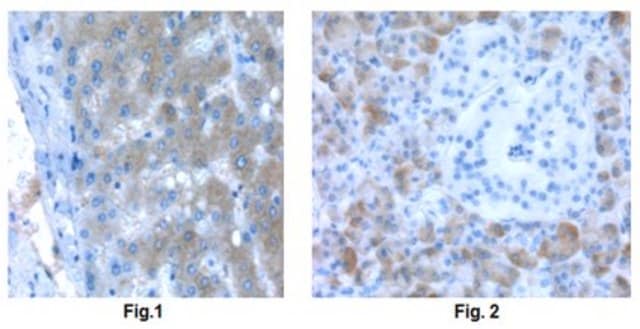04-745
Anti-trimethyl-Histone H3 (Lys4) Antibody, clone MC315, rabbit monoclonal
culture supernatant, clone MC315, Upstate®
Synonym(s):
H3K4me3, Histone H3 (tri methyl K4)
About This Item
Recommended Products
biological source
rabbit
Quality Level
antibody form
culture supernatant
antibody product type
primary antibodies
clone
MC315, monoclonal
species reactivity
human
manufacturer/tradename
Upstate®
technique(s)
ChIP: suitable (ChIP-seq)
dot blot: suitable
immunocytochemistry: suitable
immunohistochemistry: suitable (paraffin)
multiplexing: suitable
western blot: suitable
isotype
IgG
NCBI accession no.
UniProt accession no.
shipped in
dry ice
target post-translational modification
trimethylation (Lys4)
Gene Information
human ... H3C1(8350)
Related Categories
General description
The N-terminal tail of histone H3 protrudes from the globular nucleosome core and can undergo several different types of epigenetic modifications that influence cellular processes. These modifications include the covalent attachment of methyl or acetyl groups to lysine and arginine amino acids and the phosphorylation of serine or threonine.
Specificity
Immunogen
Application
Immunocytochemistry Analysis: A 1:100 dilution from a representative lot detected trimethyl-Histone H3 (Lys4) in HeLa, A431, HUVEC, and NIH3T3 cells.
Epigenetics & Nuclear Function
Histones
Quality
Target description
Linkage
Physical form
Storage and Stability
Handling Recommendations: Upon receipt, and prior to removing the cap, centrifuge the vial and gently mix the solution. Aliquot into microcentrifuge tubes and store at -20°C. Avoid repeated freeze/thaw cycles, which may damage IgG and affect product performance.
Analysis Note
HeLa acid extract
Legal Information
Disclaimer
Not finding the right product?
Try our Product Selector Tool.
recommended
Storage Class Code
10 - Combustible liquids
WGK
WGK 2
Certificates of Analysis (COA)
Search for Certificates of Analysis (COA) by entering the products Lot/Batch Number. Lot and Batch Numbers can be found on a product’s label following the words ‘Lot’ or ‘Batch’.
Already Own This Product?
Find documentation for the products that you have recently purchased in the Document Library.
Our team of scientists has experience in all areas of research including Life Science, Material Science, Chemical Synthesis, Chromatography, Analytical and many others.
Contact Technical Service








